| |
|
|
One Day Conference on
Quaid-i-Azam Muhammad Ali Jinnah
& Iqbal’s Vision of Pakistan
Organised By
MUSLIM Institute &
Government College University Faisalabad
|
|






|
|
MUSLIM Institute in collaboration of Dept. of History & Pakistan Studies, Government College University Faisalabad organized the Conference “Quaid-i-Azam Muhammad Ali Jinnah and Iqbal’s Vision of Pakistan” on Wednesday, December 19, 2018, at GC University Faisalabad. Prof. Dr. Nasir Amin (Vice Chancellor, GC University Faisalabad) chaired the inaugural session whereas Sahibzada Sultan Bahadar Aziz (Incharge Programmes, MUSLIM Institute) delivered the Opening Speech. Prof. Dr. Muhammad Iqbal Chawla (Dean, Chairman & Professor, Dept of History & Pakistan Studies, University of the Punjab, Lahore) and Mr. Arif Khattak (Assistant Professor, Dept. of Sciences & Humanities National University of Computer and Emerging Sciences, Chaniot) were guest speakers in the first session. Dr. Abdul Qadir Mushtaq (Chariperson, Dept. of History & Pakistan Studies, GCUF) moderated the proceedings of inaugural session. Sahibzada Sultan Bahadar Aziz chaired the second session of conference. Dr. Abdul Qadir Mushtaq (Chariperson, Depart of History & Pakistan Studies, (GCUF) presented vote of thanks. Dr Umair Mehmood Sidiqui (Assistant Professor, University of Karachi), Prof. Dr. M. Shafique (Dept. of History and Civilization Studies, Bahauddin Zakariya University, Multan) and Mr. Idrees Azad (International Islamic University, Islamabad) were guest speakers in the second session. Researchers, scholars, students, university professors, lawyers, journalists, social activists and people from different walks of life participated in the conference.
|
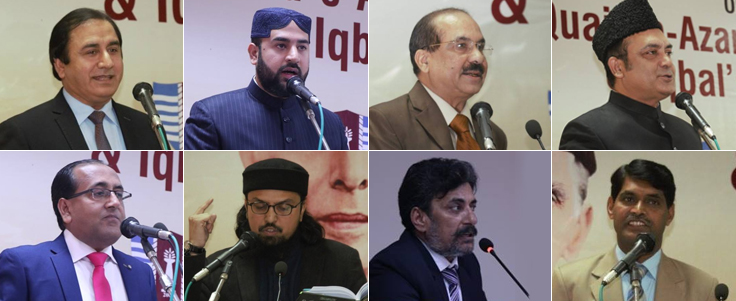
Row 01 (From Left): Prof. Dr. Nasir Amin, Sahibzada Sultan Bahadar Aziz, Prof. Dr. Muhammad Iqbal Chawla, Mr. Arif Khattak.
Row 02 (From Left): Dr. Abdul Qadir Mushtaq, Dr Umair Mehmood Sidiqui, Mr. Idrees Azad, Dr. M. Shafique
|
|
Brief summary of remarks shared by speakers is as under:
Quaid-e-Azam Muhammad Ali Jinnah and Allama Iqbal are such personalities whose thoughts and vision are constant source of guidance not only for Muslim nations of the subcontinent but also for the whole Muslim Ummah. Allama Iqbal played the role of a poet of east and a philosopher of west in twentieth century. Quaid-e-Azam Muhammad Ali Jinnah translated into reality the dream of Iqbal by attaining a separate country for the Muslims of the subcontinent. Even today, these two personalities are biggest inspiration for Muslims, especially for Pakistani people. Movement led by Quaid had a deep influence of Allama Iqbal in its affairs.
Foreign leaders visiting Pakistan, who had a chance to address our parliament, commence or conclude their speeches with the thoughts of Allama Iqbal as they consider Iqbal the identity of Pakistan. The vitality of Iqbal’s message is so universal that Kalam-e-Iqbal has been translated in many foreign languages and different nations have benefitted from the thoughts of Iqbal. We should be very clear in this respect that Allam Iqbal is the identity of Pakistan across the globe. The way minorities especially Muslims are being maltreated in India expose its secularism on one hand and reminds us on the other that the founders of Pakistan did a great favor with respect to religious and cultural freedom of the Muslims of the subcontinent. Two nation theory further strengthened and guaranteed our peaceful survival. Quaid’s foreign policy also made it clear that he always envisioned friendly relations with neighbors on the basis of equality.
|
|
|
If we want to see the perfect man of Iqbal (mard-e-kamil), true manifestation of the same can be seen in Muhammad Ali Jinnah. In the opening lines of one of his masterpieces “The Reconstruction of Religious Thoughts in Islam” Iqbal narrates that “The Quran is a book which emphasis deed rather than idea”. Iqbal was a man of thought and Quaid was a man of practice. If we combine them both, we will find a beautiful mixture of thought and practice. Quaid never compromised on his principles which were justice and fair play followed by determination.
It is very unfortunate that Pakistan is among those very few countries where national heroes are being questioned. It is being questioned today that why Pakistan was created and what kind of Pakistan was envisioned by Quaid-e-Azam? Especially those who do not have sufficient knowledge about the history of Pakistan find faults with the vision of Quaid and Iqbal. If we take a view of the cabinet mission plan, Quaid designated Hindu national over one seat out of total five seats whereas Indian national congress designated all the six seats to Hindus. Critics have to acknowledge the fact that Quaid’s policy was complete justice and fair play. He always talked about the charter of Medina. When Lord Mountbatten advised Quaid that they should run Pakistan in accordance with the model given by Mughal emperor Akbar, Quaid vehemently replied that they had been granted real model some thirteen hundred years ago.
|
|
|
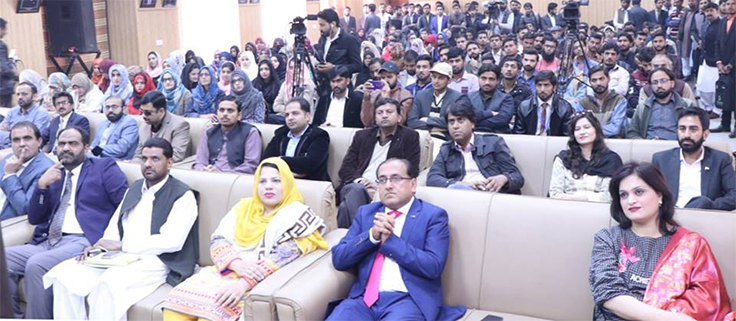
Participants view during the conference.
|
|
In his assertions, Allama Iqbal not only transformed the approach of Muslims but also addressed the causes behind the downfall of Muslims. Chaudhary Rehmat Ali wrote the pamphlet “Now or Never” in 1933 in which he used the word Pakistan for the first time. Somebody asked Allama Iqbal of his being part of the movement of Chaudhary Rehmat Ali. Iqbal replied in positive. Iqbal inculcated the approach through his sermons that a separate country should be established for Muslims comprising Muslim majority areas. There is a dire need that we should study letters written by Iqbal and speeches made by Quaid. Allama Iqbal and Quaid envisioned a modern welfare Islamic state which can only be dreamt in the materialization of Pakistan. Today, we still need to further strengthen the vision of Quaid and the dream of Iqbal. For the very purpose, we have to seek the resolution of our prevailing differences with the promise that we shall stand by democratic values and love this holy land.
|

Stage view during the second session of conference chaired by H.E. Sahibzada Sultan Bahadar Aziz.
|
|
Interactive Session
|
|
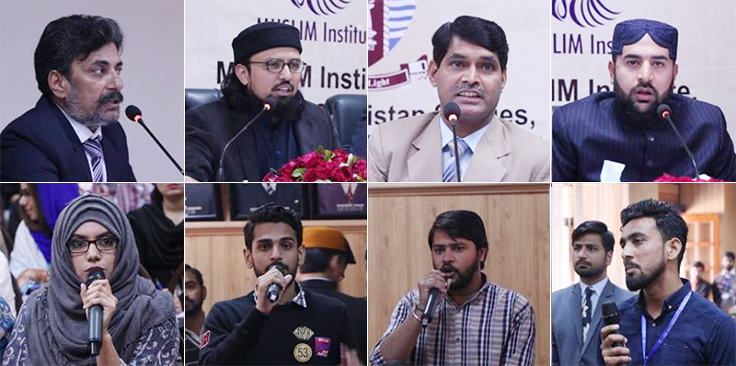
Participants asking questions during the interactive session of conference.
|
|
An exchange of views between speakers and participants during the interactive session is as under:
In the of state of Medina peaceful coexistence was ensured in the plural society having religious and cultural diversity. We need to implement Islam in its true spirit by setting aside the sectarianism. While highlighting the rights of minorities, Allama Iqbal and Quaid-e-Azam vehemently endorsed the principles given by the Holy Prophet (PBUH) for the protection of minorities. Islamic state is completely responsible to ensure sanctity of life and property of its citizens irrespective of their religion. As Holy Prophet (PBUH) narrates that if somebody unjustly kills someone in an Islamic state, he shall never be able to even smell the fragrance of heaven. We can easily experience the Pakistan envisioned by Quaid-e-Azam and Allama Iqbal in the light of the sayings of Quaid and Iqbal. But we are far away from their approach practically. The problem with Pakistan is more of implementation of laws rather than legislation. If our public institutions especially courts function with full dignity, justice and fair play, we can definitely fulfill the dream of Pakistan envisioned by Quaid and Iqbal. In the Holy Quran, Allah Almighty said, “And hold firmly to the rope of Allah all together and do not become divided”. Same is the concept propounded by Iqbal in his poetry, “May the Muslims unite in protecting the Haram.
From the banks of Nile to the deserts of Kashghar” and by Hadrat Sultan Bahoo (R.A) in his Sufi poetry “I am neither ‘Sunni’ nor ‘Shia’ my heart is disgusted with both of them –Hoo”. In the light of all above golden sayings, we should abstain from sectarianism or schisms of any sort.
|
|
Cultural Musical Session on Kalam-e-Iqbal
|
|
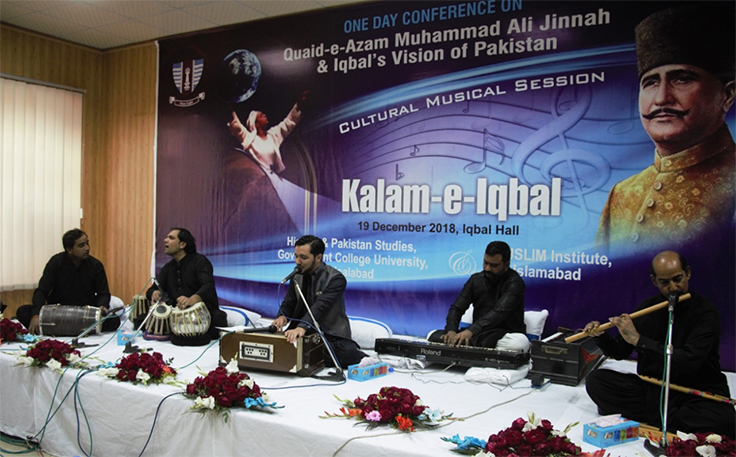
Stage view during the musical session of conference.
|
|
After two academic sessions of the conference, a ‘Cultural Musical Session on Kalam-e-Iqbal’ was also organized. In this Cultural & Musical Session, Raja Hamid Ali presented Kalam-e-Iqbal. Researchers, scholars, students, university professors, lawyers, journalists, social activists and people from different walks of life participated in the event.
|
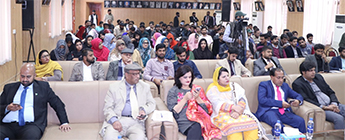
Participants view in musical session of conference.
|
|
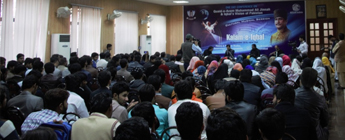
Stage and hall view in musical session of conference.
|
|
|
| |
|
|
|
|
|
| |
|